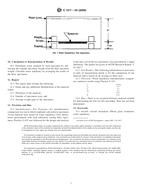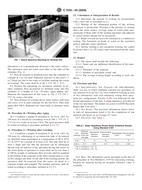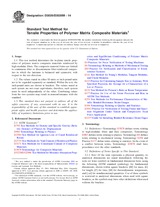We need your consent to use the individual data so that you can see information about your interests, among other things. Click "OK" to give your consent.
ASTM D7194-12
Standard Specification for Aerospace Parts Machined from Polychlorotrifluoroethylene (PCTFE)
STANDARD published on 1.10.2012
The information about the standard:
Designation standards: ASTM D7194-12
Note: WITHDRAWN
Publication date standards: 1.10.2012
SKU: NS-37825
The number of pages: 5
Approximate weight : 15 g (0.03 lbs)
Country: American technical standard
Category: Technical standards ASTM
The category - similar standards:
Annotation of standard text ASTM D7194-12 :
Keywords:
annealing, dimensional stability, finished parts, PCTFE, polychlorotrifluoroethylene, ICS Number Code 49.025.40 (Rubber and plastics), 49.140 (Space systems and operations)
Additional information
| 1. Scope | ||||||||||||||||||||||||
|
1.1 This specification is intended to be a means of calling out finished machined parts ready for aerospace use. Such parts may also find use in selected commercial applications where there are clear benefits derived from the use of parts with known or controlled crystallinity, high molecular weight, good molecular weight retention during processing, dimensional stability in the finished part, and tightly controlled engineering tolerances. 1.2 This specification establishes requirements for parts machined from virgin, unplasticized, 100 % polychlorotrifluoroethylene (PCTFE) homopolymers. 1.3 This specification does not cover parts machined from PCTFE copolymers, PCTFE film or tape less than 0.25-mm (0.010-in.) thick, or modified PCTFE (containing pigments or plasticizers). 1.4 This specification does not allow parts containing recycled material. 1.5 The specification does not cover PCTFE parts intended for general use applications, in which control of dimensional stability, molecular weight, and crystallinity are not as important. For machined PCTFE parts intended for general use, use Specification D7211. 1.6 This specification classifies parts into three classes based upon intended uses and exposures: oxygen-containing media, reactive media, and inert media. 1.7 Application—PCTFE components covered by this specification are virgin, 100 % PCTFE resin, free of plasticizers and other additives. The components are combustion resistant in oxygen, dimensionally stable, and meet other specific physical characteristics appropriate for their end use. They are used in valves, regulators, and other devices in oxygen, air, helium, nitrogen, hydrogen, ammonia, and other aerospace media systems. The components typically are used as valve seats, o-rings, seals, and gaskets. They are removed and replaced during normal maintenance procedures. The components provide reliable sealing surfaces resulting in proper closure of valves and related devices and no leakage from the system into the environment. They will experience static mechanical loading, cyclic mechanical loading, temperatures ranging from cryogenic to 71 ºC (160 ºF), and pressures up to 68.9 MPa (10,000, psig) for oxygen and air media, and 103.4 MPa (15,000 psig) for inert media. 1.8 The values stated in SI units are to be regarded as standard. The values in parentheses are for information only. 1.9 The following precautionary caveat pertains only to the test methods portion, Section 12, of this specification: This standard does not purport to address all of the safety concerns, if any, associated with its use. It is the responsibility of the user of this standard to establish appropriate safety and health practices and to determine the applicability of regulatory limitations prior to use.
|
NASA-STD-6001B
|
Flammability, Offgassing, and Compatibility Requirements and Test Procedures--Mechanical Impact for Materials in Ambient Pressure LOX (Test 13A) and Mechanical Impact for Materials in Variable Pressure GOX and LOX (Test 13B)
|
|
Standard Test Method for Determining Ignition Sensitivity of Materials to Mechanical Impact in Ambient Liquid Oxygen and Pressurized Liquid and Gaseous Oxygen Environments
|
|
Standard Practice for Conditioning Plastics for Testing
|
|
Standard Specification for Parts Machined from Polychlorotrifluoroethylene (PCTFE) and Intended for General Use
|
|
Standard Terminology Relating to Plastics
|
|
Standard Test Method for Tensile Properties of Plastics
|
|
Standard Terminology for Abbreviated Terms Relating to Plastics (Withdrawn 2024)
|
|
Standard Test Method for Tensile Properties of Plastics by Use of Microtensile Specimens
|
|
Standard Test Method for Compatibility of Materials with Liquid Oxygen (Impact Sensitivity Threshold and Pass-Fail Techniques) (Withdrawn 2023)
|
|
Standard Test Method for Determining Temperatures and Heats of Transitions of Fluoropolymers by Differential Scanning Calorimetry
|
|
Standard Test Methods for Density and Specific Gravity (Relative Density) of Plastics by Displacement
|
|
Standard Classification System for Polychlorotrifluoroethylene (PCTFE) Plastics |
Similar standards:
Historical
1.5.2009
Historical
1.5.2009
Historical
1.6.2007
Historical
15.5.2014
Historical
1.8.2013
Historical
15.5.2009
We recommend:
Technical standards updating
Do you want to make sure you use only the valid technical standards?
We can offer you a solution which will provide you a monthly overview concerning the updating of standards which you use.
Would you like to know more? Look at this page.



 ASTM C1511-04(2009)..
ASTM C1511-04(2009).. ASTM C1559-04(2009)..
ASTM C1559-04(2009).. ASTM C274-07
ASTM C274-07 ASTM D3039/D3039M-14..
ASTM D3039/D3039M-14.. ASTM D3518/D3518M-13..
ASTM D3518/D3518M-13.. ASTM E2533-09
ASTM E2533-09
 Cookies
Cookies
